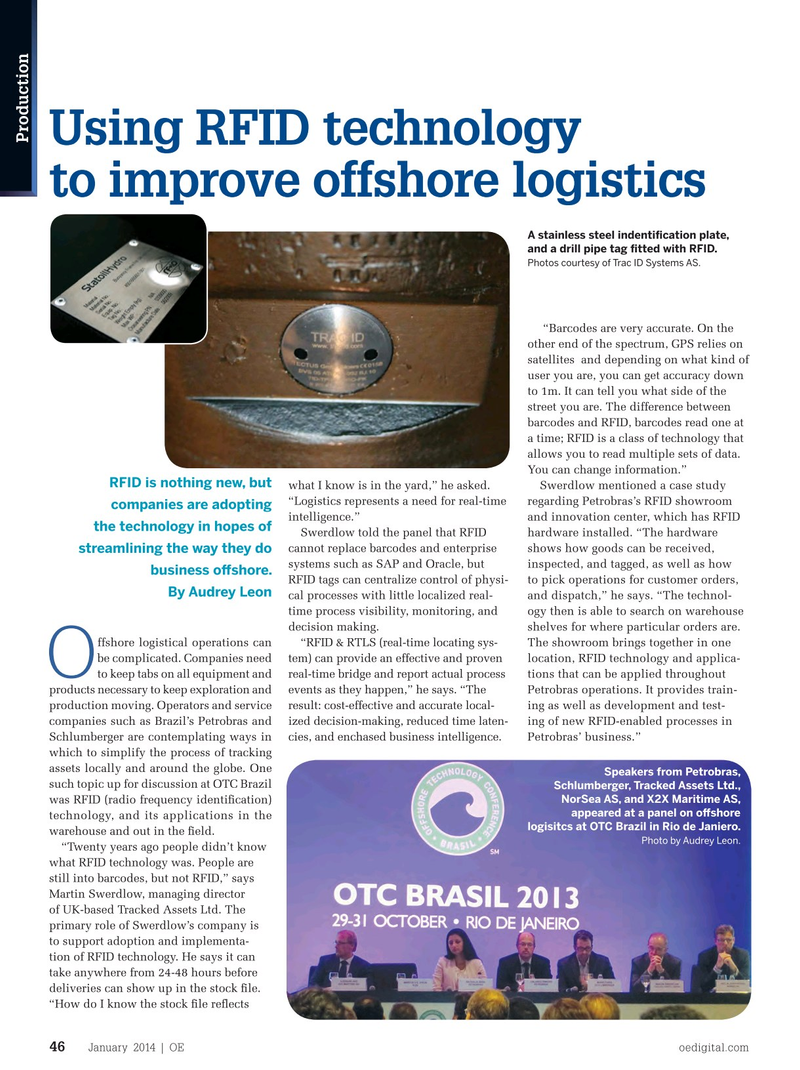
Page 44: of Offshore Engineer Magazine (Jan/Feb 2014)
Read this page in Pdf, Flash or Html5 edition of Jan/Feb 2014 Offshore Engineer Magazine
Production
Using RFID technology to improve offshore logistics
A stainless steel indentifcation plate, and a drill pipe tag ftted with RFID.
Photos courtesy of Trac ID Systems AS.
“Barcodes are very accurate. On the other end of the spectrum, GPS relies on satellites and depending on what kind of user you are, you can get accuracy down to 1m. It can tell you what side of the street you are. The difference between barcodes and RFID, barcodes read one at a time; RFID is a class of technology that allows you to read multiple sets of data.
You can change information.”
RFID is nothing new, but what I know is in the yard,” he asked. Swerdlow mentioned a case study “Logistics represents a need for real-time regarding Petrobras’s RFID showroom companies are adopting intelligence.” and innovation center, which has RFID the technology in hopes of
Swerdlow told the panel that RFID hardware installed. “The hardware cannot replace barcodes and enterprise shows how goods can be received, streamlining the way they do systems such as SAP and Oracle, but inspected, and tagged, as well as how business ofshore.
RFID tags can centralize control of physi- to pick operations for customer orders,
By Audrey Leon cal processes with little localized real- and dispatch,” he says. “The technol- time process visibility, monitoring, and ogy then is able to search on warehouse decision making. shelves for where particular orders are. ffshore logistical operations can “RFID & RTLS (real-time locating sys- The showroom brings together in one be complicated. Companies need tem) can provide an effective and proven location, RFID technology and applica-
O to keep tabs on all equipment and real-time bridge and report actual process tions that can be applied throughout products necessary to keep exploration and events as they happen,” he says. “The Petrobras operations. It provides train- production moving. Operators and service result: cost-effective and accurate local- ing as well as development and test- companies such as Brazil’s Petrobras and ized decision-making, reduced time laten- ing of new RFID-enabled processes in
Schlumberger are contemplating ways in cies, and enchased business intelligence. Petrobras’ business.” which to simplify the process of tracking assets locally and around the globe. One
Speakers from Petrobras, such topic up for discussion at OTC Brazil
Schlumberger, Tracked Assets Ltd.,
NorSea AS, and X2X Maritime AS, was RFID (radio frequency identifcation) appeared at a panel on ofshore technology, and its applications in the logisitcs at OTC Brazil in Rio de Janiero. warehouse and out in the feld.
Photo by Audrey Leon. “Twenty years ago people didn’t know what RFID technology was. People are still into barcodes, but not RFID,” says
Martin Swerdlow, managing director of UK-based Tracked Assets Ltd. The primary role of Swerdlow’s company is to support adoption and implementa- tion of RFID technology. He says it can take anywhere from 24-48 hours before deliveries can show up in the stock fle. “How do I know the stock fle refects
January 2014 | OE oedigital.com 46 048_OE0114_ProdOps1.indd 46 12/19/13 6:16 PM

 43
43

 45
45